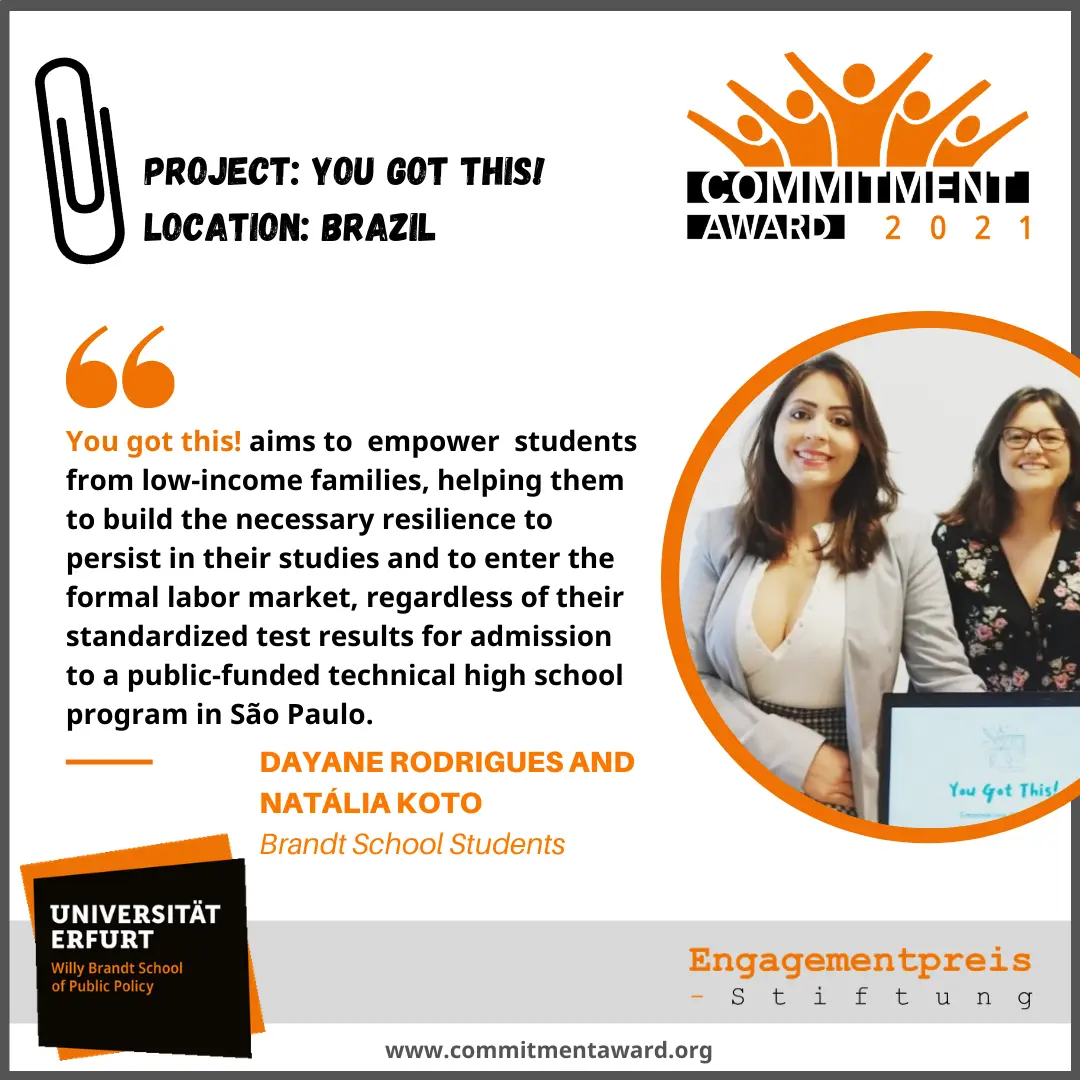Commitment Award 2021: get to know the projects!
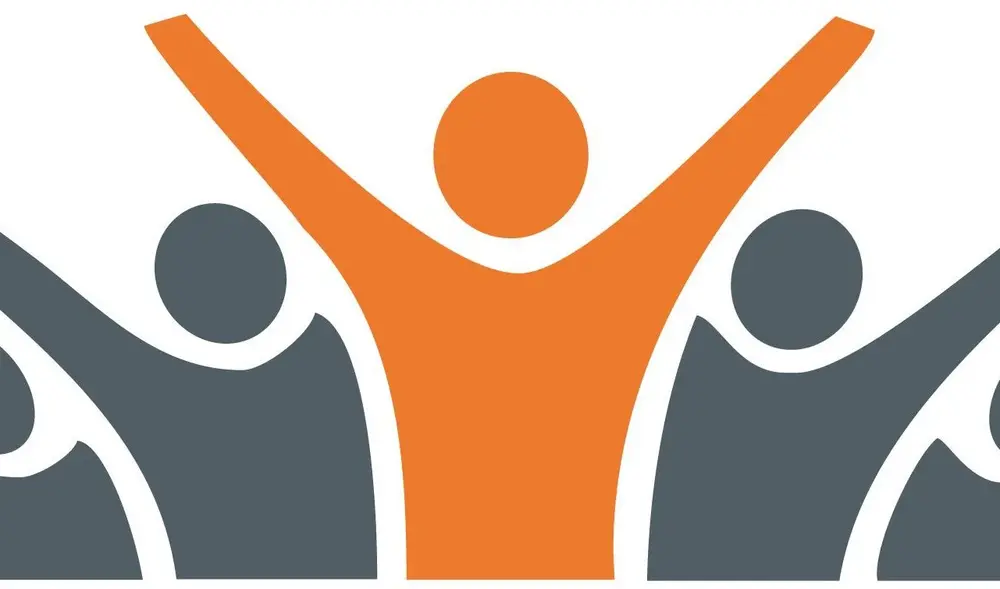
Willy Brandt himself represented social change, which was reflected in his social and political reforms. He believed that policies serve no purpose if the policy makers did not have a specific goal in mind when creating it. Thus, in the multicultural and diverse setting of the Brandt School, the Commitment Award seeks to give students the opportunity to apply what they’ve learned at the Brandt School and to initiate new social initiatives here in Erfurt and around the world. Three winning projects are chosen at the annual award ceremony in Erfurt. Any student currently enrolled or alumni from the Brandt School may submit an application.
This year, 9 projects are competing for the three prizes. We introduce them below.
Find out the winners on June 17 at 6pm (CEST) on decennial.commitmentaward.org!
Die Version auf Deutsch können Sie hier finden.
Project 1: Jorge Andrés Tapia de los Reyes and Bernardo Gortaire M.
“A computer for a promising future” (Ecuador)
Brandt School almunus Jorge Andrés Tapia de los Reyes and Bernardo Gortaire M. submitted the project “A computer for a promising future”. The project is a circular economy initiative in which second-hand devices are restored to ensure online education for children in vulnerable communities, who have been affected by the technological gap and the COVID-19 pandemic. With this program, they want to ensure education permanence, and reduce the impact generated by technological waste, thus creating a sustainable future for Ecuadorian children and communities.
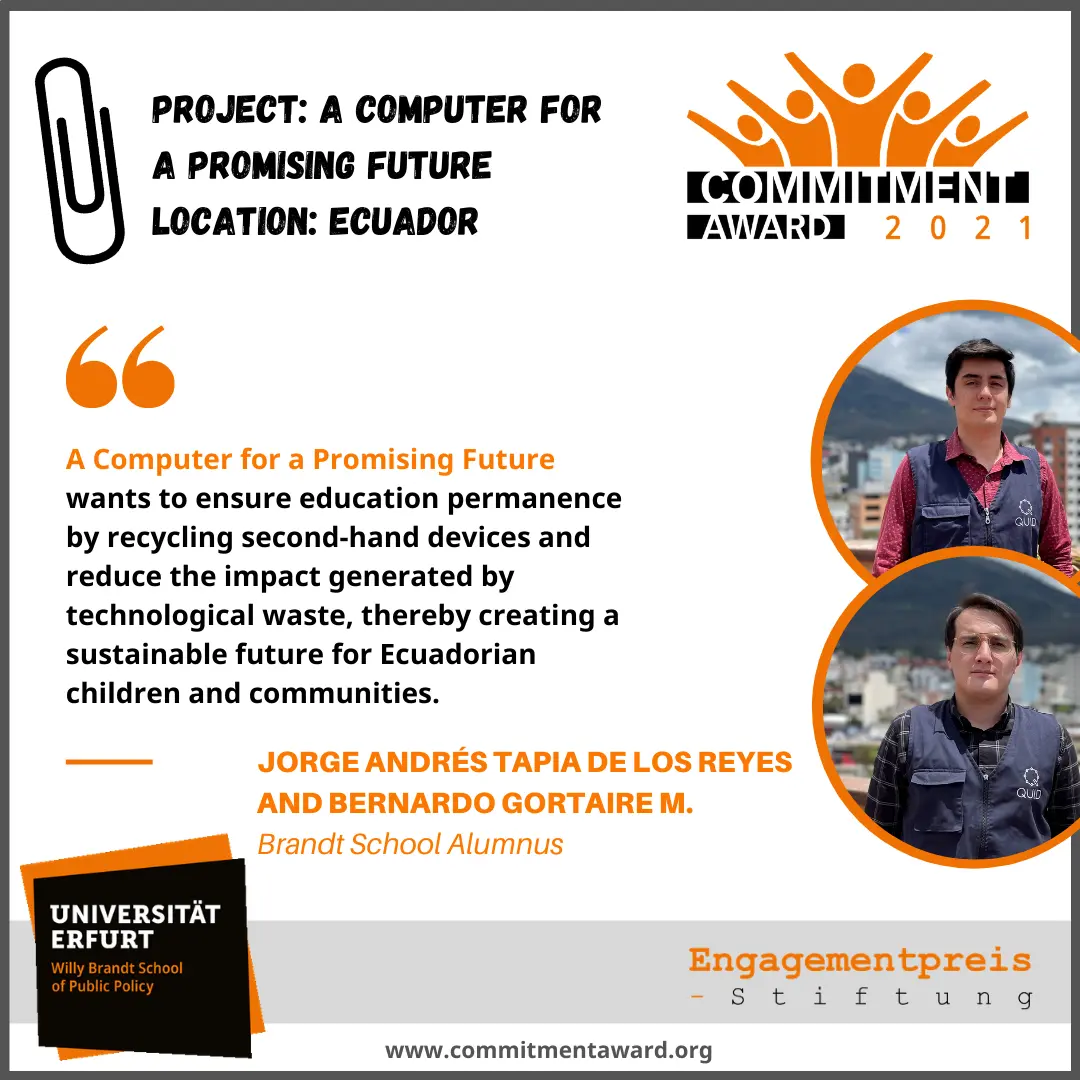
Project 2: Chukwudi Johnpaul Okolo, Francis Ugoo Ezekoma and Kate Ebele Odinachi
“Akawo-Esusu Micro Loan for Rural Women Breadwinners” (Nigeria)
Kate Ebele Odinachi and the Brandt School students Chukwudi Johnpaul Okolo and Francis Ugoo Ezekoma submitted the project “The Akawo-Esusu Micro Loan for Rural Women Breadwinners (Akawo Rural Women Loan)”, which is an initiative designed to support breadwinning mothers by helping them access low-interest loans, grow their business initiatives and care for their children’s health, food, education, and total wellbeing. This is against the backdrop that 70% of the women in Enugu, Nigeria, take responsibility for their children as the fathers. who engage in subsistent day-pay work are not able to sustain such responsibilities, leave the women to it, while making them victims of domestic violence. Through this project, ten women breadwinners will access the loan on a chain-guarantorship model and an akawo repayment plan to grow their businesses and support the education, health and feeding of their children. This will also impact the society to curb girl-child exploitation and other negative peer influence impeding societal peace.
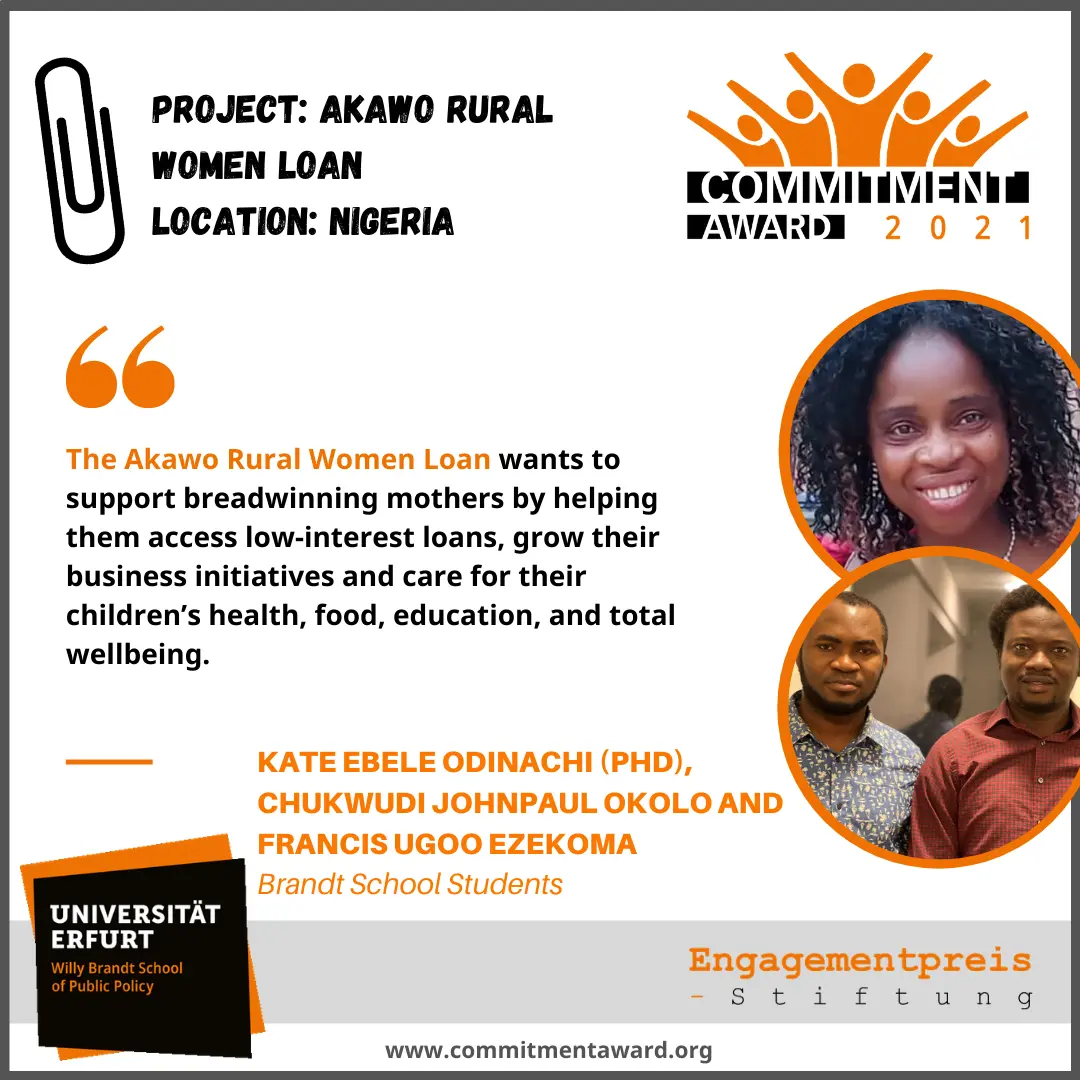
Project 3: Chloe Rouillard and Houssein Al Malla
“Die Grenzüberschreitende Sprachbrücke (DGS) - Barrierefreie Integration” (Germany)
“Die Grenzüberschreitende Sprachbrücke” (DGS) is a project submitted by Brandt School students Chloé Rouillard and Houssein Al Malla. The project aims to match international students with residents of elderly and special needs homes in order to improve the German language skills of international students, integrate them into German society, and decrease overall loneliness of the residents of these care institutions.
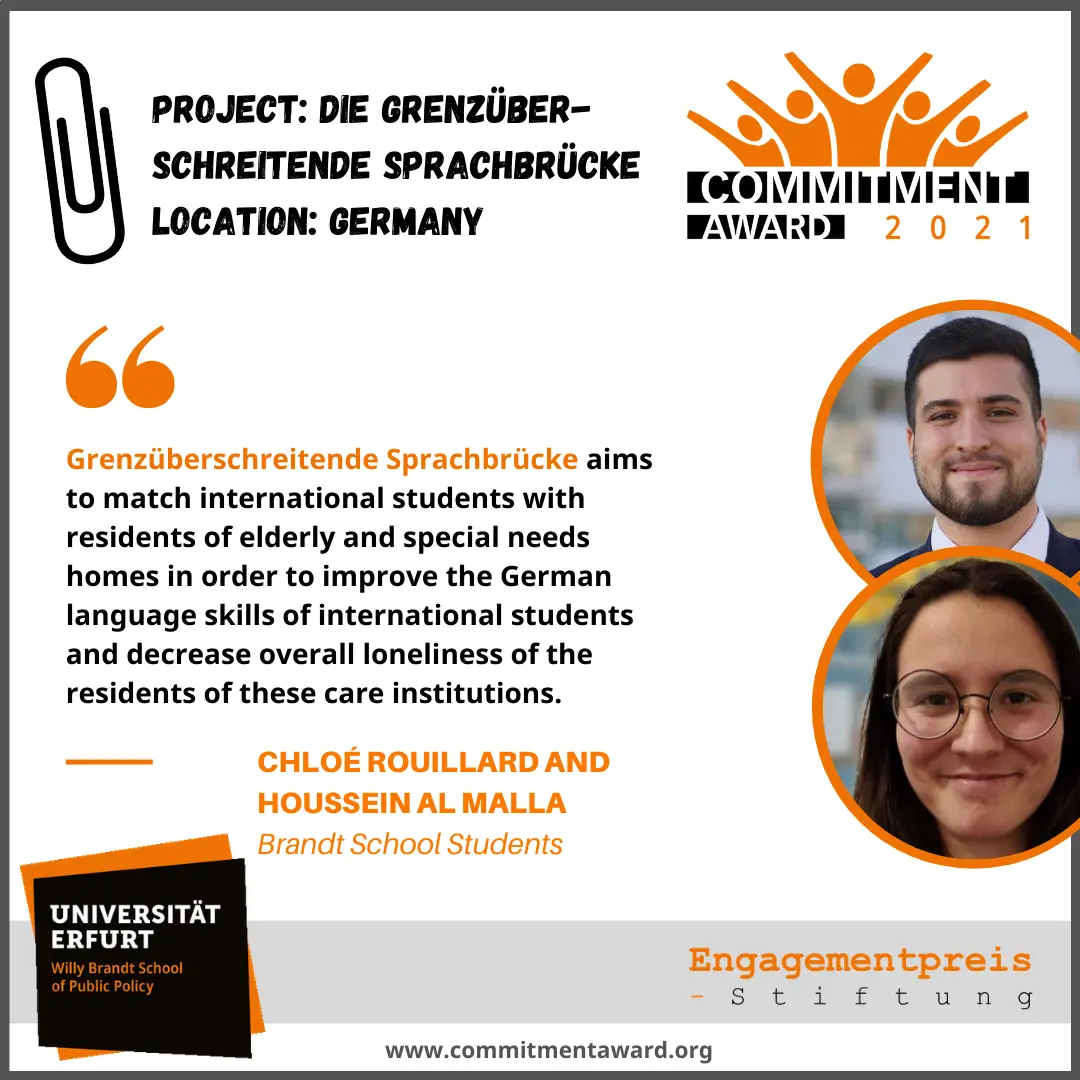
Project 4: Mercedes Bustan
“Education for Future” (Ecuador)
The project “Education for Future” was submitted by Brandt School student Mercedes Bustan. In the first five years of schooling, children who study at public schools in Ecuador do not receive English language education. Most of these children cannot afford private lessons or extracurricular English classes. This harsh reality is reflected in the rankings that place Ecuador in the last place among the 19 Latin American countries according to the English Proficiency Index of Education First. "Education for Future" proposes an eight-month English program where children aged six to12 years learn a new language and develop reading, listening, writing, and speaking skills and at the same time, enhance their talents through painting, dancing, drawing, reading, and acting. The project is offered to disadvantaged children to help them develop an early motivation to learn a new language and strengthen their talents through art. Participation in the Education for Future program will result in creating better academic and professional opportunities for many children who lack comprehensive education.
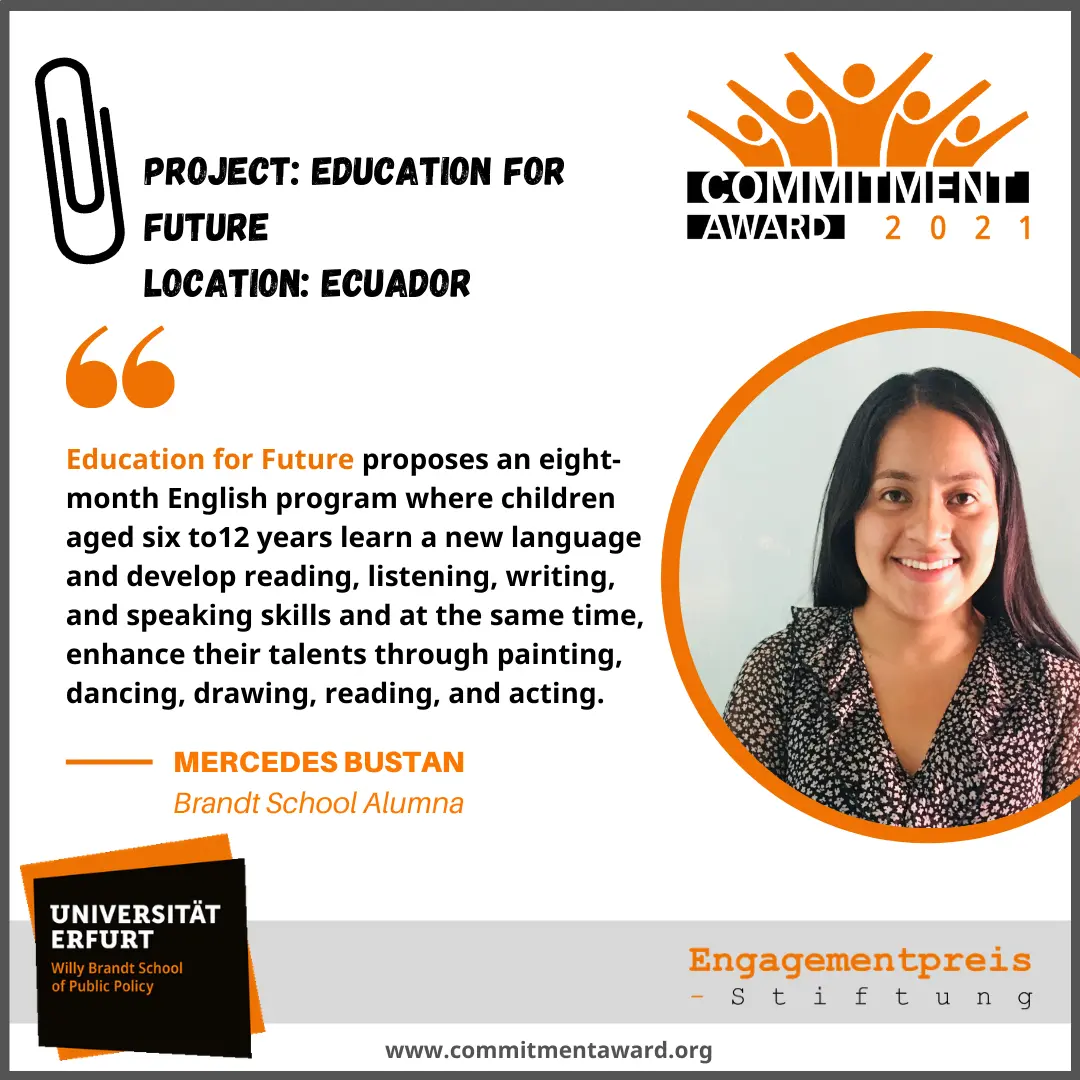
Project 5: Armando Guçe
“Flow of Change” (Albania)
Brandt School student Armando Guçe submitted the project “Flow of Change”. Albania is a country with rich water resources. Yet, most of its resources are wasted due to mismanagement or the lack of infrastructure. The Viroi Lake in Gjirokaster, Albania is an excellent example of such a case. During the Communist regime, the lake used to be a lively natural park with water turbines that could generate enough electricity for the businesses in the park and the houses nearby (in other words, a perfect example of an eco-park). Nowadays, this image is quite forgotten as neither the central nor the local government pays attention to the issue. The project aims at drawing as much attention as possible by establishing a collaboration between private enterprises that operate in the Viroi Lake, the municipality of Gjirokaster and the Energy Distribution Operator (OSHE) in order to 're-establish' an eco-park in the area and teach actors involved (but also beyond) the advantages of renewables.
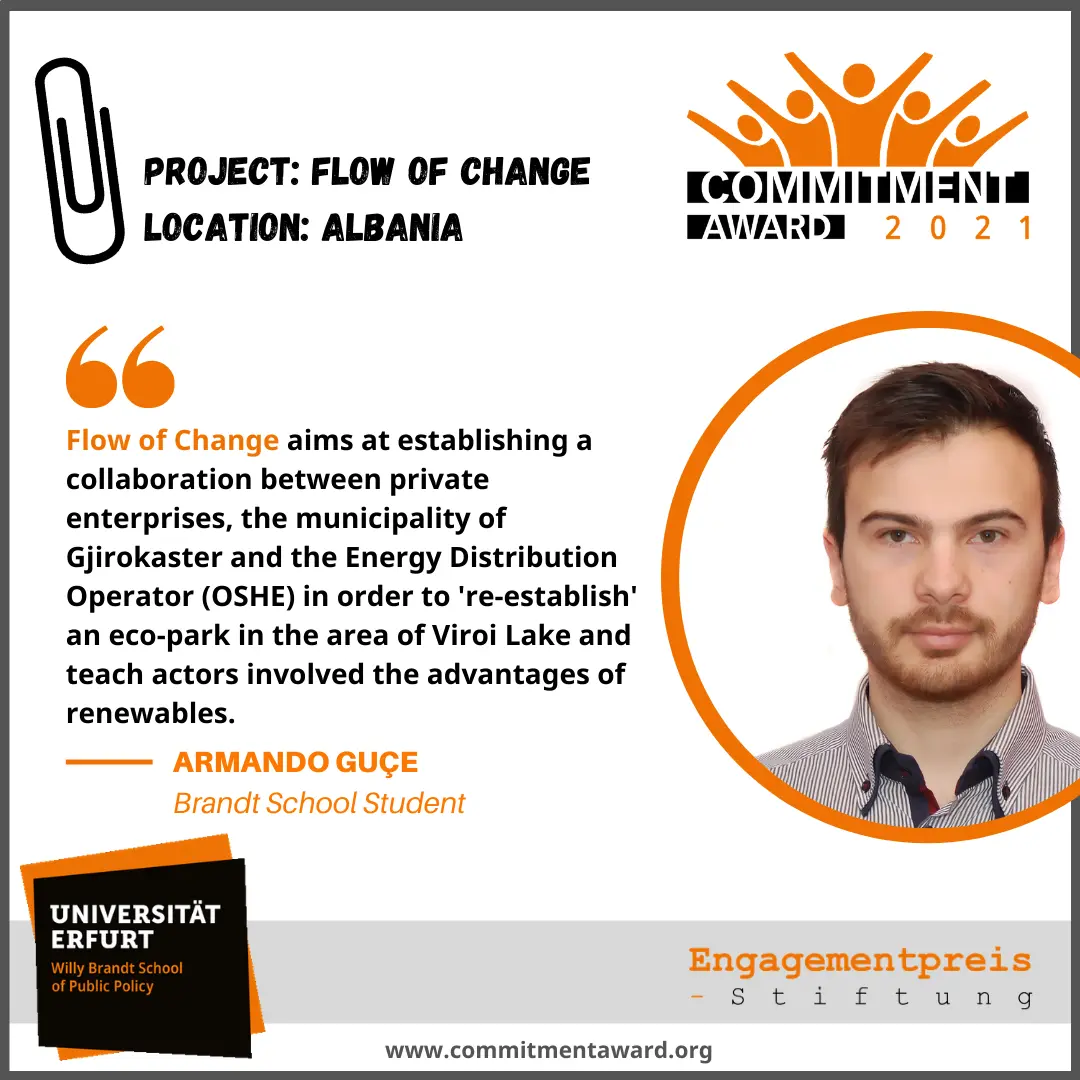
Project 6: Komal Ramdey and Jens Mannanal
“From the Margins to the Centre” (India, Germany)
Brandt School student Komal Ramdey and Jens Mannanal submitted the project “From the Margins to the Centre”. According to a 2018 report by the National Human Rights Commission, nearly 15% of the transgender community in India is forced into begging and sex work and 15% are unemployed across Delhi and Uttar Pradesh. Among the employed population, the socio-economic conditions are very low. Some transgenders are well educated and want to work in mainstream jobs but are denied opportunities because of the stigma. Covid 19 has made the situation worse for transgenders and left them at augmented risk of hunger and poverty since most of them make their living on the streets by begging, street entertainment and paid sex. Rather than living fully, they survive on the margins. Therefore, the “Margins to Centre” project aims to improve the socio-economic status of these transgenders by providing them with a platform for mentorship and upskilling them to find employment opportunities that will ease the socio-economic struggle they go through in their daily lives.
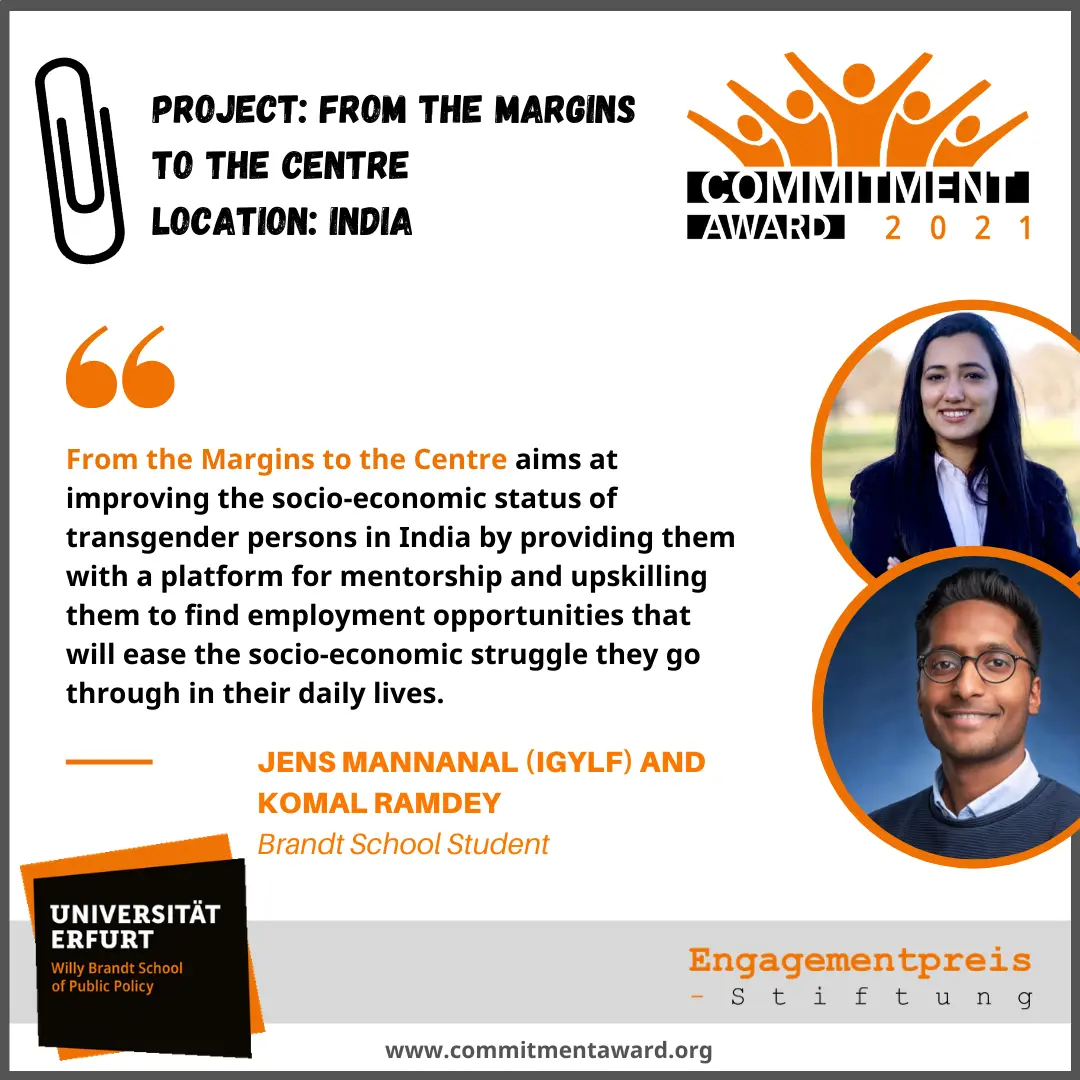
Project 7: Athar Farooq and Nafisa Islam Fariba
"Right Skills - Bright Future" (Pakistan)
Brandt School students Athar Farooq and Nafisa Islam Fariba submitted the project “Right Skills – Bright Future”, an initiative to upskill women through digital education, so they can be self-employed and self-dependent. The aim of this project is to build a bridge between the challenges and opportunities of acquiring and utilizing digital education in Pakistan in the disputed territory of Azad Jammu and Kashmir. The freelancing market provides immense opportunity for females of Pakistan, a country with the lowest women employment rate in the world. If provided the right tools and education, college students more prone to dropouts could work self-employed from home. The aim is to pilot with a certain number of female students in collaboration with Read Foundation, an NGO with 390 local schools and colleges all over Pakistan. The project plans to provide the female students a starting point with digital skills, so that going forward they can participate in the digital labor force and achieve financial independence.
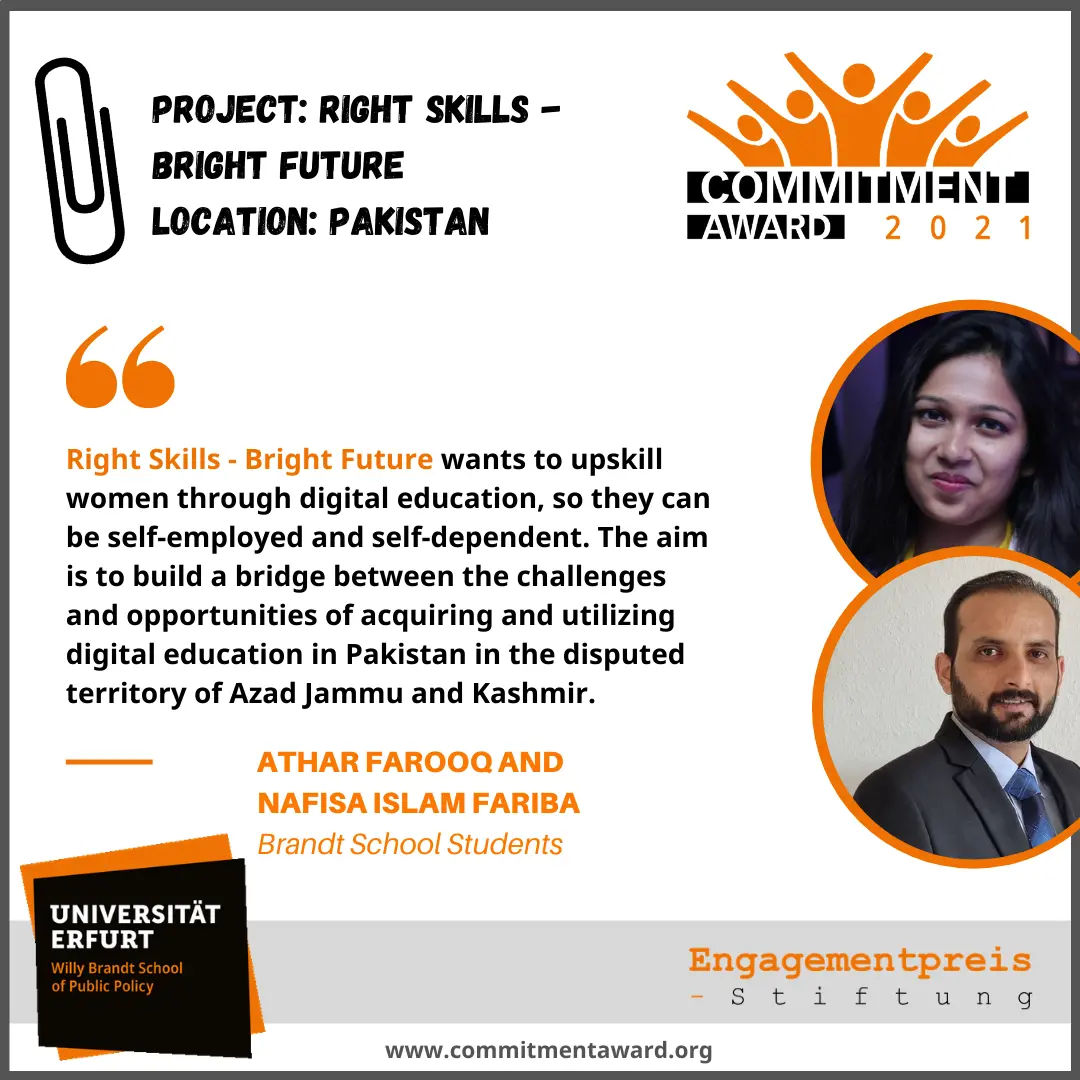
Project 8: Ruvimbo Matsika
“Talitha Cumi” (Zimbabwe)
Brandt School alumna Ruvimbo Matsika submitted the project “Talitha Cumi”. Since the early 2000s, Zimbabwe has been expressing political unrest which has led to a collapse of the economy. In 2020, the World Bank revealed that extreme poverty was estimated to be at 49%, which has since worsened due to the COVID-19 pandemic. The collapse of the economy and hyperinflation (838%) has resulted in the near-extinction of the government’s development spending, and free education is not feasible. Parents are forced to make the tough decision of deciding which child to educate given the limited resources. Thus girls are less likely to attend a school as their families can barely afford to feed them. Girls are left vulnerable and some of them end up in forced underage marriages although forbidden by the law. Talitha Cumi will work for and with girls, community members, and local municipalities in Zimbabwe to advance equality and achieve social justice for girls, to educate and empower them as they break cycles of generational poverty, cultural and economic barriers.
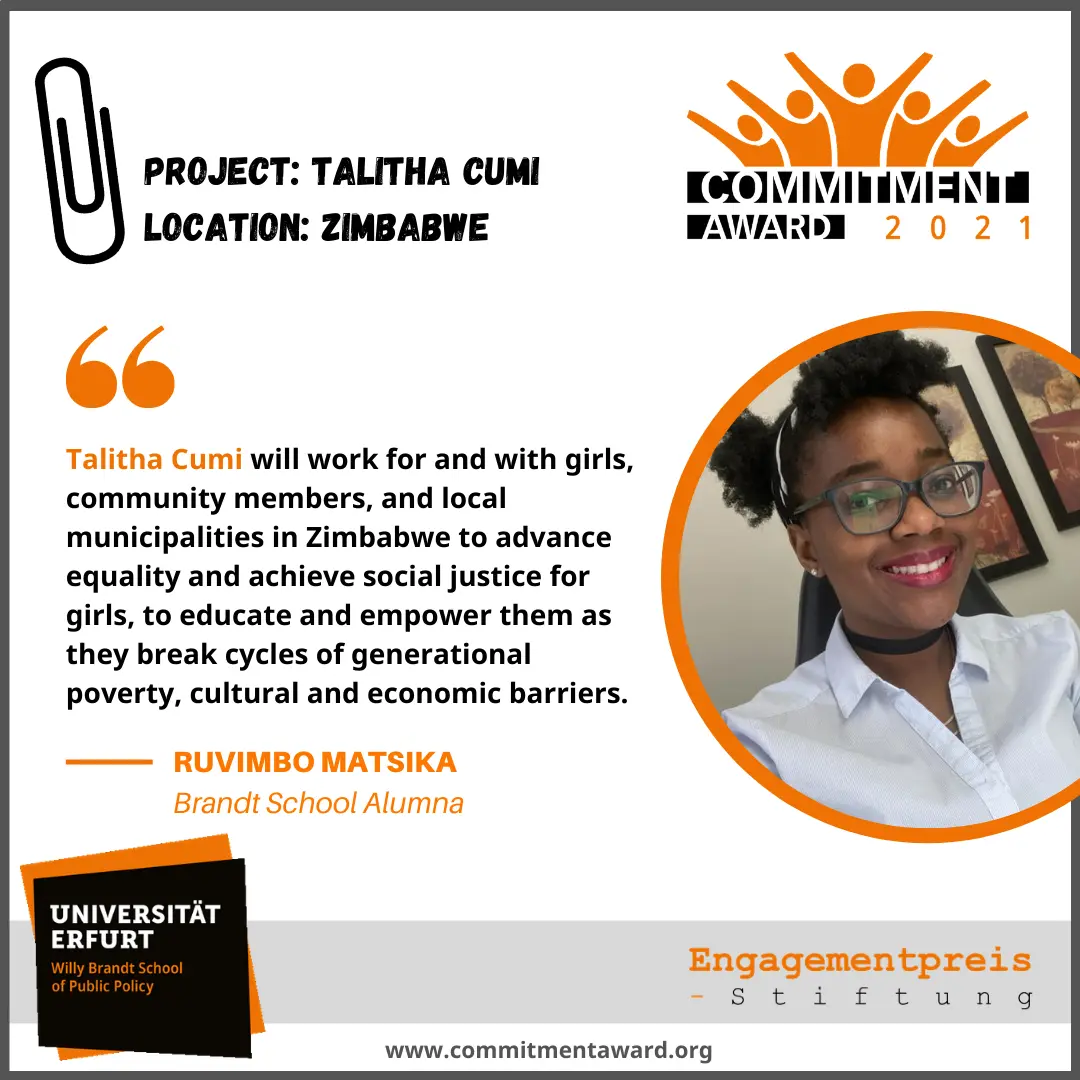
Project 9: Dayane Rodrigues, Natália Koto
“You Got This!” (Brazil)
Brandt School students Dayane Rodrigues and Natália Koto submitted the project “You Got This!”, which shall be implemented in cooperation with the Associacao Estudo e Trabalho (AET). The AET is an NGO that provides free extra classes to support students from low-income families to pass an admission test, which enables access to a public-funded technical high school program in São Paulo (ETEC). You got this! aims to complementarily empower these students, helping them to build the necessary resilience to persist in their studies and to enter the formal labor market, regardless of their standardized test results. It is a unique initiative, given the technical knowledge, soft skills development, and tools offered. The students can benefit from such skills throughout their lives, whether they choose an academic or a technical path. Therefore, You got this! consists of a mentoring program with the potential of breaking the intergenerational poverty cycle by increasing their abilities to low-income students succeed in life.
